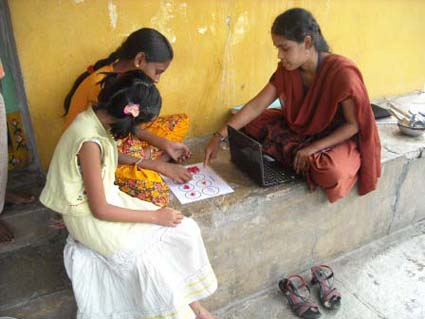
Breadcrumb
Round 4 of the Young Lives survey starts in India
The fourth round of Young Lives survey started this week in India. Over the next few months a team of 42 fieldworkers along with seven supervisors will travel to 20 sentinel sites including more than 100 communities across the seven districts of Andhra Pradesh to interview 3,000 children, young adults and their parents or caregivers.
The survey started on Saturday with interviewing the community stakeholders - public officials, community leaders, wage labourers and shopkeepers - so as to understand the services and facilities available to children and young adults in each community, what the typical wages are in the area and what basic items cost.
The India study includes one cohort of 2,000 children now aged between 11 and 12 years old, and almost 1,000 young people aged between 17 and 18 years. When the survey started, in 2002, the younger group were just 6 to 18 months old and the older group were aged 7 to 8 years.
An up-to-date snapshot
The Round 4 (2013) survey will offer an up-to-date snapshot of the lives of the children, young people and their families which can be compared with data collected in 2002, 2006 and 2009. This information then feeds into reports that help inform and influence public policy-making to support the children and youth of India.
In preparation for the survey, the Young Lives India team completed a rigorous programme of training for fieldworkers and supervisors which started with the Training of Trainers (ToT) in April. The six-week fieldworker training then followed on at Kakatiya University, Warangal, Andhra Pradesh from the end of May to the first week of July, 2013. During the training period seven pilots were completed.
One of the innovations of the Round 4 survey is that for the first time mini laptops are being used for data collection. With the help of SurveyBe software, the quality of data collection can thus be enhanced as well as drastically reducing the time required for data entry. Another area of focus in the training was familiarising the fieldworkers with some of the new questions in the survey. For example, now the Older Cohort will be aged around 19 years, some of them will have moved away from their original households to marry or to work. Fortunatley, most of the fieldworkers have been involved in previous Young Lives survey rounds and therefore already have a good understanding of the survey.
Rich dataset
The Round 4 data will provide us with a rich dataset that will help us to understand how children?s lives in India have changed over the last decade. What makes Young Lives special is that it captures children?s perspectives on poverty, and so analysis of the data will help researchers, civil society organisations and other stakeholders to put children ? and their views - at the centre of policy debates. We will know what policies have worked, what have been the gaps and what these children aspire to and hope for in the future.
Fieldwork will be completed by January 2014, and initial findings will be published by mid-2014. Subsequently, the questionnaires and the final clean data will be made freely available to the public, as with the previous rounds. The data will serve as the basis for analysis and a range of papers will be produced, all available to view and download on our websites www.younglives-india.org and www.younglives.org.uk.
Looking forward, there will be one further round of the survey in 2016, making Young Lives a unique 15-year four-country (Ethiopia, Andhra Pradesh in India, Peru and Vietnam) longitudinal dataset exploring the causes and consequences of childhood poverty.
Links:
Methods Guide:
http://www.younglives.org.uk/what-we-do/research-methods/methods-guide

